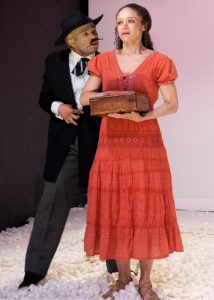
An Octoroon by Branden Jacobs-Jenkins (2014) In an invigorating act of theatrical demolition, Mr. Jacobs-Jenkins resurrected — and exploded — Dion Boucicault’s dusty 19th-century melodrama about a doomed romance on a slaveholding plantation. This artfully layered play uses meta-theatrical monologues, strategic colorblind casting and an avalanche of cotton balls to explore the crippling absurdity of conventional ideas of race, then and now.
Barbecue by Robert O’Hara (2015) Four of the white O’Mallery siblings gather by picnic tables for a party that is actually a decoy to the lure the crack addict fifth to an intervention. Ten minutes of low-rent hilarity later, after a blackout, the scene continues, but now the O’Mallerys are black. How that does and doesn’t change our view of them is the first of several detonations set off by this booby-trapped comedy.
Underground Railroad Game by Jennifer Kidwell and Scott R. Sheppard (2016). The show that proposes that we all might need a “safe word” when it comes to discussing race. This production from the innovative Lightning Rod Special begins as a middle school history lesson about the underground railroad. What follows is a boundary-crossing, id-plumbing portrait of an interracial love affair between the class’s teachers — Ms. Kidwell is black and Mr. Sheppard is white — that reminds us that theater still has the power to shock.
Kill Move Paradise by James Ijames (2017)This haunting, grief-steeped work, inspired by the shooting of 12-year-old Tamir Rice by a Cleveland police officer, imagines an afterlife in which the spirits of young black men try to comprehend how and why they died. The answers do not come easily, if at all. A choral tone poem of a play in which current history becomes an endless, cyclical nightmare.
Fairview by Jackie Sibblies Drury (2018) The winner of the 2019 Pulitzer Prize for Drama, this is a play created expressly to discomfort, and turn the tables on, its audience. A show that begins as a domestic sitcom reminiscent of “The Cosby Show” annotates, rewrites and ultimately dismantles itself, while asking acute and troubling questions about how the African-American experience is framed, contained and shrunken by the white gaze.
What to Send Up When It Goes Down by Aleshea Harris (2018) Described by its author as both “an anger spittoon” and a means of creating “a space in the theater that is unrepentantly for and about black people,” this singular work combines song, dance, ritual, satirical sketches and monologues of mourning to conjure the mortal fear and loathing that rule black American lives in the era of Trayvon Martin and Sandra Bland. A jubilant and scary exercise in catharsis.
Pass Over by Antoinette Nwandu (2018) For Moses and Kitch, poor young black men in a modern American city, the warm greeting “Yo, kill me now” is always answered with a reassuring “Bang bang.” That’s no metaphor; death, hovering so closely around them, may be the only thing they can confidently expect to achieve. If their rituals recall Beckett’s tramps in “Waiting for Godot,” they also reference plantation America and biblical Egypt; this is a tragedy too big for any one era to encompass.
Slave Play by Jeremy O. Harris (2018) What at first seems like absurd plantation porn featuring slaves and overseers is soon revealed to be sex therapy role-play for contemporary interracial couples. Though the therapy focuses on the white “blind spot” in which black partners feel they disappear, the play as a whole is looking at something bigger: the dysfunction of the interracial partnership of America.
White Noise by Suzan-Lori Parks (2019) Ralph, who’s white, and Leo, who’s black, have been pals since college, each thinking he is somehow beyond race. But when Leo is assaulted by police officers, hairline cracks in his sense of self gape open. To close them, he makes a shocking suggestion: that he become, for 40 days, Ralph’s slave. The experiment not only revises the relationships between the two men (and also their girlfriends) but our idea of how far past the past really is.
Ain’t No Mo by Jordan E. Cooper (2019)Peaches is the boarding agent for African-American Airlines flight 1619 — the one taking all black citizens of the United States on a one-way trip to Africa. The shocker is that the exodus is so eagerly embraced, for reasons demonstrated in this anthology of mostly satirical sketches about racism run rampant. “If you stay here,” Peaches says, “you only got two choices for guaranteed housing, and that’s either a cell or a coffin.”


